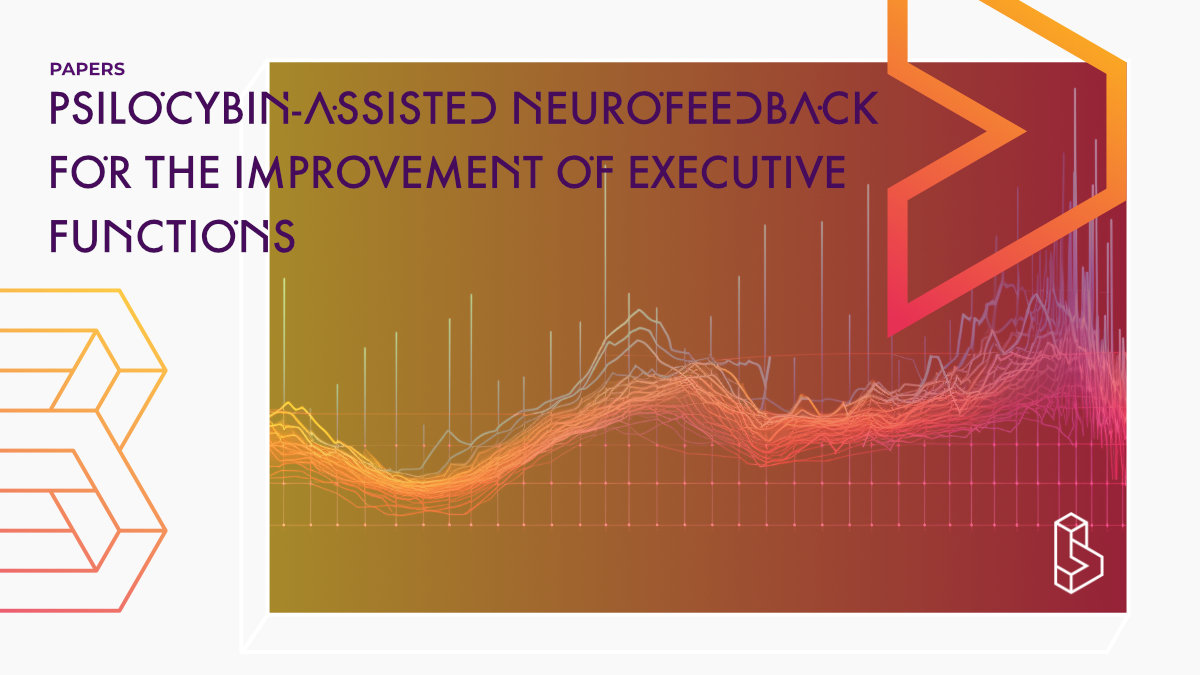This experimental study (n=37) explored the integration of psilocybin-assisted neurofeedback in individuals with psychiatric disorders and executive function deficits. The participants received three microdose sessions followed by three psilocybin-assisted neurofeedback sessions. While there were no immediate improvements in experimental tasks assessing executive functions, significant self-reported improvements in daily life executive functions were observed, including working memory, shifting, monitoring, and inhibition, with high effect sizes.
Abstract of Psilocybin-assisted neurofeedback for the improvement of executive functions: a semi-naturalistic-lab feasibility study
“Widespread executive function deficits impair daily functioning in psychiatric disorders. In this group, reduced frontal-midline-theta neurofeedback responsiveness may be related to impaired neural plasticity. In our pioneering study, we investigated the feasibility and practicality of integrating a neuroplasticity agent by psilocybin-assisted neurofeedback. Thirty-seven participants were divided into an experimental and a passive control group. The experimental group received three microdose sessions followed by three psilocybin-assisted neurofeedback sessions. Our results showed changes in self-regulatory frontal-midline theta from session-to-session approaching significance. Importantly, placebo ratings and expectations did not differ between the two groups. There were no immediate improvements in the experimental tasks assessing executive functions. However significant improvements were observed in self-reported executive functions in daily life. Participants reported improvements in working memory, shifting, monitoring and inhibition with high effect sizes. In addition, the experimental group reported positive changes in their priority areas, which included cognition, presence and mood. These results suggest that psilocybin-assisted neurofeedback shows promise for a potential transdiagnostic treatment. Future research should investigate the optimal timing and duration of this pharmacological and neuroscientific combination. Overall, our study highlights the feasibility and potential of this innovative approach, emphasizing the potential for enhanced neuroplasticity that may amplify the impact of neurofeedback.”
Authors: Stefanie Enriquez-Geppert, Jaroslav Krc, Fiachra O’Higgins & Morten P. Lietz
Summary of Psilocybin-assisted neurofeedback for the improvement of executive functions: a semi-naturalistic-lab feasibility study
Introduction
Cognitive impairments is a transdiagnostic feature, common to all forms of psychopathology, particularly affecting executive functions. Executive dysfunctions are associated with reduced autonomy, impede functional recovery, and impede the efficacy of behavioural and pharmacological therapies across a spectrum of disorders.
EFs rely on the intact neural functioning of the fronto-cingulo-parietal network, and an increase in frontal-midline (fm) theta power is usually associated with improved cognitive processing and predicts successful performance in EFs. Neurofeedback (NF) is a neuroscientific method directly targeting cognitive processes by enabling participants to self-regulate the neural underpinnings.
Find this paper
https://doi.org/10.31234/osf.io/jqasf
Open Access | Google Scholar | Backup | 🕊
Cite this paper (APA)
Enriquez-Geppert, S., Krc, J., O'Higgins, F., & Lietz, M. P. (2023). Psilocybin-assisted neurofeedback for the improvement of executive functions: a semi-naturalistic-lab feasibility study.
Study details
Compounds studied
Psilocybin
Topics studied
Neuroscience
Microdosing
Study characteristics
Case Study
Participants
37
Humans

